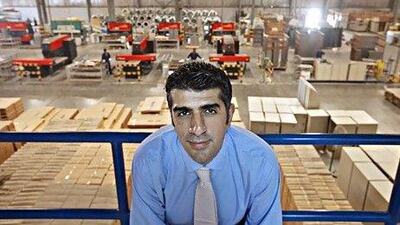Almost a decade ago, Nitin Bhatia returned to Dubai with a marketing degree from the United States. He quickly spotted a gap in the booming construction and development market, which created a demand for steel cabinets, and an opportunity to fill it arose with Al Khalij Enterprises.
The group was looking to diversify its portfolio and Mr Bhatia needed his opportunity to enter the business world. Along with a couple of family members, he came up with an idea of locally manufactured steel cabinets.
And so in 2004, Rexel Industries, a sister concern of Al Khalij, was born in the Jebel Ali Free Zone with an initial focus on the UAE and the Arabian Gulf.
Small to medium enterprises such as Rexel are the backbone of the UAE economy, with more than 80 per cent of the non-oil economy depending on SMEs, according to the UAE auditing and consulting firm Morison Menon. But before entering the foreign markets, some of the SME owners warn about checking out the distributors and advise focusing on marketing and networking overseas, even with one's competitors.
"Branching out for SMEs is a natural progression to move up the value chain," says Prathit Harish, a partner at the consultancy PricewaterhouseCoopers in Dubai.
"And this is true not only for the manufacturing sector but also professional services such as IT consulting, marketing and even cleaning services."
It is estimated that 10 to 15 per cent of the 200,000 SMEs in the UAE actively work with distributors, partners and their sales staff outside the country.
Below is a toolkit for SMEs looking to grow overseas.
Follow market demand
For SMEs looking to set up a physical presence in the foreign market, "follow your biggest customers", says Mr Harish.
Jebel Ali's Rexel followed feedback from overseas exhibitions.
"When we started there was a growing demand for steel cabinets here and there were not many companies locally manufacturing these," says Mr Bhatia, the director of sales and marketing at Rexel.
"But through the exposure we got in the UAE, which is a global transit point, we were able to enter the export market in early 2005."
As with generations of migrants, businesses are wise to point their compass towards places where they have at least a few friends.
Beat the swings
One aspect of global operations that SMEs should factor in is that they are susceptible to currency and commodity fluctuations.
"It might happen that we buy a cargo at one price and the day after the price drops - that's why we try to buy and sell almost at the same time," said Elnaz Taherizadeh, the managing director at Telsam Metals in Dubai, which imports steel billets and re-exports them to Iran.
While Telsam did not face such a situation, its parent company Elsa Group, based in Tehran, did.
"They faced a huge loss, but you have to continue the cycle to avoid bankruptcy or any [other] problems," she said.
Plug into a network
At a conference in Russia last year, Ms Taherizadeh, 27, felt oddly out of place.
The French citizen says the other delegates were "all men, older than me but … during the question-and-answer session I took the microphone and introduced myself and my company".
That broke the ice and Ms Taherizadeh says a few men walked up and inquired about her company.
Study the competition
"You have to know what they are doing, find a common point and share a business deal with them," says Ms Taherizadeh. "It is important that a big company knows my name."
Find the right partners
Having the right distributors in foreign markets is key.
"Sometimes eagerness to enter into a certain market can be damaging for your brand if you don't understand your distributors," says Mr Bhatia, 30, said.
The company, which employs 100 people and had an annual turnover of Dh12 million (US$3.2m) from the export market last year, has now grown to 24 countries, including India, Nigeria, Ghana, Azerbaijan and Kazakhstan beyond the Middle East.
"We made this mistake initially … but it requires patience and persistence to find the right partner."

